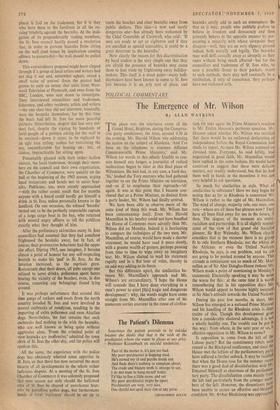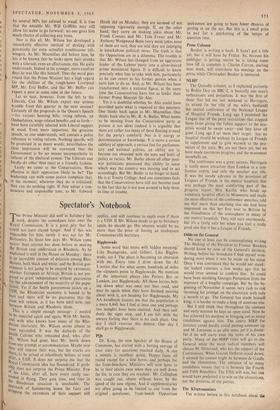POLITICAL COMMENTARY
The Emergence of Mr. Wilson
By ALAN WATKINS
MHE place was the television room of the
I Grand Hotel, Brighton, during the Conserva- tive party conference; the time, around 9.30 in the evening. Mr. Harold Wilson was addressing the nation on the subject of Rhodesia. 'And I've been on the telephone to nineteen different Commonwealth Prime Ministers,' said Mr. Wilson (or words to this effect). Unable to con- tain himself any longer, a journalist of radical inclinations began to titter at this final piece of Wilsoniana. He had had, in any case, a hard day. 'RV hushed the Tory matrons who had gathered together to see the Prime Minister on television, and—as if to emphasise their reproach—`sh' again. It was at this point that I became con- vinced that as a Prime Minister, as distinct from a party leader, Mr. Wilson had finally arrived.
We have been able to observe more of the same kind of thing this week. Mr. Wilson has been statesmanship itself. Even Mr. Harold Macmillan in his heyday could not have handled the House of Commons more adroitly than Mr. Wilson did on Monday. Indeed it is fascinating to compare the techniques of the two men. Mr. Macmillan, of course, would have made a shorter statement; he would have read it more slowly, with a greater wealth of gesture, perhaps pausing from time to time to wipe away an imaginary tear. Mr. Wilson elected to read his statement rapidly and in a flat tone of voice, thereby in an odd way adding to its force.
But this difference apart, the similarities be- tween Mr. Macmillan's approach and Mr. Wilson's are extraordinary. 'I hope the House will concede that I have done everything in a man's power to avert [this] tragic and dangerous development': why, the words might have come straight from Mr. Macmillan after one of his numerous sorties overseas in the cause of civilisa- lion. Or take again the Prime Minister's reaction to Mr. Emlyn Hooson's pertinent question. Mr.
Hooson asked whether Mr. Wilson was satisfied that there would be no unilateral declaration of independence before the Royal Commission had made its report. At.once Mr. Wilson assumed an elevated tone. Everyone, he said loftily, had negotiated in good faith. Mr. Macmillan would have replied in the same fashion. He would have contrived to suggest that these were delicate matters, not readily understood, but that he had them well in hand; in the meantime it was not very helpful to ask questions.
So much for similarities in style. What, of similarities in substance? Here we may begin by noting that as far as Rhodesia is concerned Mr. Wilson is rather to the right of Mr. Macmillan. The wind of change, majority rule, one man, one vote--where are all these fine phrases now? They have all been filed away for use in the future, if then. The slogans of the moment are multi- racialism and partnership. It is all slightly remini- scent of the view of that grand old Socialist pioneer, Sir Roy Welensky. Mr. Wilson clearly considers that at the moment there is no group fit to rule Southern Rhodesia; not the whites or the Africans or even the United Nations. Rhodesia, he says, is our problem, and we are not going to be pushed around by anyone. This attitude is reminiscent not so much of Mr. Mac- millan as of Sir Alec Douglas-Home (whom'Mr. Wilson made a point of mentioning in Monday's statement). Electorally speaking it may be none the worse for this: at the same time it is worth remembering that in his opposition days Mr. Wilson would appear to become highly incensed at Sir Alec's attitude towards the United Nations.
During the past few months, in short, Mr. Wilson has emerged as a national Prime Minister
and his handling of the Rhodesia crisis is illus' trative of this. Though this development gives
him a considerable electoral advantage, it is not a wholly healthy one. The trouble can be put in this way : from where, in the next year or so, 15 effective opposition to Mr. Wilson to come?
Is opposition to come from the left of the Labour party? But the constituency rebels were routed at the Blackpool conference, and since the
House met the leftists of the parliamentary part have suffered a further setback. It may be recalled that when the House rose for the summer recess
there was a good deal of dissatisfaction with Mr. Emanuel Shinwell as chairman of the parlianiery tary party. The dissatisfaction came mainly front
the left and particularly from the younger mar bers of the left. However, the dissentients have been unable to secure an effective anti-ShinWe,I candidate. Mr. Arthur Blenkinsop was approached
by several MPs but refused to stand. It is true that the amiable Mr. Will Griffiths may still allow his name to go forward: no one gives him much chatice of collecting any votes.
Nor is this all. Mr. Wilson has developed a remarkably effective Method of dealing with potentially (or even actually) troublesome left- wingers. As Mr. Macmillan did before him, he lets it be known that he looks upon their pranks with a tolerant, even an affectionate, eye. He quite understands. Indeed in his younger, more carefree days he was like this himself. Thus the word goes round that the Prime Minister has a high regard for the abilities of the rough-hewn Liverpool MP, Mr. Eric Heifer, and that Mr. Heifer can expect a post at some time in the future.
Let us turn, however, from the left to the Liberals. Can Mr. Wilsoh expect any serious trouble from this quarter in the next session? Certainly all the proposals in the Queen's Speech —for various housing bills, rating reform, an Ombudsman, wage-related benefits and so forth— have been carefully selected with Liberal support in mind. Even more important, the gracious speech, so one understands, will contain a polite reference to voting reform. Nothing specific will be promised in so many words; nevertheless the clear impression will be conveyed that the Government is by no means unsympathetic to reform of the electoral system. The Liberals can hardly do other than react in a friendly fashion.
Lastly we come to the Conservatives. How effective is their opposition likely to be? The leadership can with some justice complain that, at the moment, whatever they do is criticised; they can do nothing right. If they adopt a con- structive and responsible tone, as Mr. Edward Heath did on Monday, they are accused of not opposing vigorously enough. If, on the other hand, they carry on making jokes about Mr. Frank Cousins and Mr. Tom Fraser and Mr. Anthony Wedgwood Benn (very weak jokes most of them are too), they are told they are indulging in knockabout political turns. The truth is that the Opposition are in a dilemma. The trouble is that Mr. Wilson has changed from an aggressive leader of the Labour party into a silver-haired prime ministerial figure. It is difficult to know precisely what line to take with him, particularly as he can revert to his former person when it suits him to do so. And, as Mr. Wilson has been transformed into a national figure, at the same time the Conservatives have lost as leader their former Prime Minister Sir Alec.
Yet it is doubtful whether Sir Alec could have provided quite what is required at this juncture. One thinks back again to Mr. Macmillan. One thinks back also to Mr. R. A. Butler. What seems to be missing from the Conservative party at present is not ideas (indeed it is arguable that there are rather too many of these floating around for the party's comfort). Nor is it energy or determination or knowledge. It is more a certain subtlety of approach, a certain feel for parliamen- tary and national politics, an ability not to become too obsessed with the nuts and bolts of policy or tactics. Mr. Butler above all other post- war politicians possessed this ability to sense which way the country was moving and to act accordingly. But Mr. Butler is no longer at hand. He is at Trinity College. And one sometimes feels that the Conservatives have still not become used to the fact that he is not now around to help them in time of trouble.







































 Previous page
Previous page